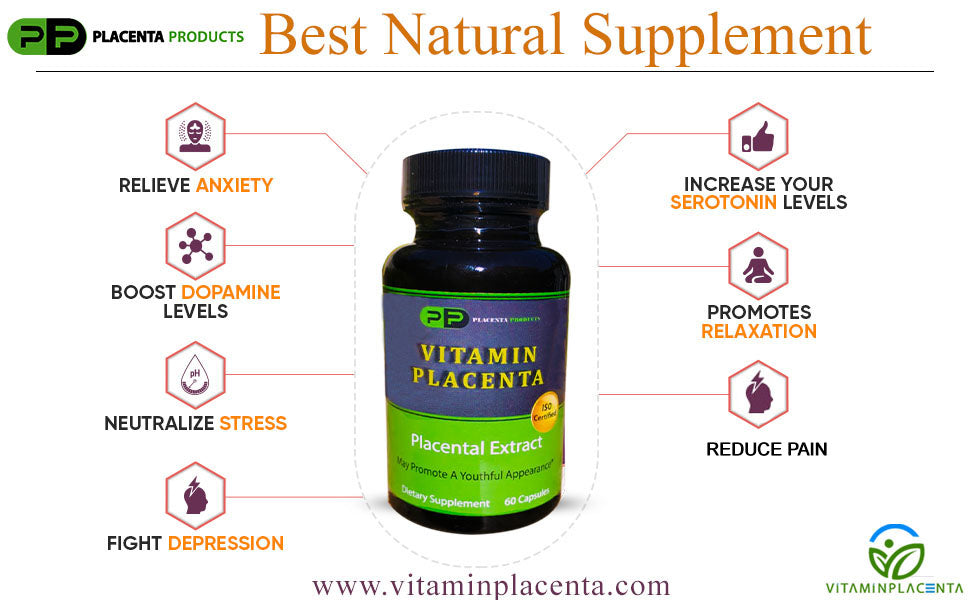Best Natural Supplement
Best Natural Supplement for Anxiety and Depression
Vitamins for Anxiety and Depression

Anxiety disorders and depressions are among the most common of all mental disorders, and when combined with an understanding of the disability and reduced quality of life they cause, they must be recognized as a severe public health issue. The placenta has long been known to benefit the brain and body in a variety of ways, but one of the most well-known is its ability to alleviate symptoms of anxiety and depression, especially postpartum depression.
For thousands of years in Traditional Chinese Medicine, the placenta was saved for its medicinal properties and eaten to obtain certain health benefits. As Western medicine advanced, modern research demonstrated the benefits of placenta consumption, proving that the Chinese were correct in their belief in the health benefits of eating placenta.
The placenta contains stem cells, which can differentiate into various types of cells. Collagen, elastin, laminin, vitamins, trace elements, nucleic acids, amino acids, peptides, cytokines, and growth factors are all found in human placental extracts. Placenta cells can also secrete various hormones. These distinct properties make placental tissue a helpful resource in the maintenance of human health and wellness. And the placenta is usually consumed in the form of capsules or pills.

Corticotropin-releasing hormone (CRH)
Corticotropin-releasing hormone (CRH), also known as corticotropin-releasing factor (CRF), is a peptide hormone that stimulates the pituitary gland’s synthesis and release of adrenocorticotropic hormone (ACTH). In this way, CRH influences our reactions to stress, addiction, and depression, among other things.
During pregnancy, hormones such as oxytocin, human placental lactogen, progesterone, estrogens, and neurohormones like a thyroid-stimulating hormone (TSH), adrenocorticotropic hormone (ACTH), and corticotropin-releasing hormone (CRH) are produced at an exponential rate. Fetal cortisol production stimulates placental CRH secretion. The increased CRH concentration in the maternal blood stimulates the secretion of additional CRH, ACTH, and cortisol. Cortisol is commonly referred to as the "stress hormone" because it is produced in response to physical and psychological stressors. The concentration of placental hormones drops significantly after the placenta is delivered (Johnson et al. 2018).
Placentophagy supporters believe that the placental corticotropin-releasing hormone found in the placenta will increase levels in the postpartum mother after placental ingestion, resulting in decreased stress and improved mood. This could explain why so many women nowadays report benefits from placenta supplementation.
Placenta pills — a natural supplement for anxiety, depression, and baby blues
Over 20 years of preclinical research point to the CRF system playing a role in anxiety and stress responses. Clinical studies have supported a model of CRF dysfunction in depression, as well as a possible contribution to specific anxiety disorders. CRF has been shown to impact a variety of neurotransmitter systems, including glutamate, dopamine, serotonin, and norepinephrine. Its modulation of serotonin and norepinephrine release specifically supports a role in emotional responding, as these neurotransmitter systems are involved in affective and anxiety responses, both normal and disordered (Risbrough et al. 2006)

According to research, anxiety and depression can be treated naturally with placental tissue, which can be found in placenta pills. The placenta has the ability to alleviate anxiety and depression by releasing corticotropin-releasing hormone (CRH). This hormone is only found in placental tissue and is released by the brain. It controls a variety of brain functions, including circadian rhythm and mood. It helps synchronize other hormones and the sleep-wake cycle by balancing the circadian rhythm, thus curing insomnia and improving mood. CRH functions as a natural anti-anxiety vitamin. It not only regulates the circadian rhythm but also reduces anxiety and stress. It performs this in a natural and effective manner, without the negative side effects associated with pharmaceutical drugs for anxiety, which can overly sedate people and cause long-term dependency, tolerance, and addiction.
Furthermore, it is believed that vitamins B12 and B6, folate, and iron found in placental tissue may treat any deficiency that may occur during the postpartum period, and thus the placenta reduces depression (Beacock 2012, Marraccini et al. 2015). Placenta capsules or extracts are high in vitamins and minerals, allowing the body to rebalance any deficiencies naturally.

Vitamin Placenta Pills
Many women have agreed to the fact that the placenta can significantly elevate mood, and research supports this as well. It can also boost energy and revitalize the body. Overall, it benefits both the mind and the body, making it the most complete vitamin available.
Vitamin Placenta was created in the United States to take advantage of all of the beneficial aspects of placental consumption and bring them to you through a specialized extract of placental tissue that can benefit both men and women. This placenta product provides a low-cost way for anyone to reap the benefits of placental supplementation.
Based on the first-hand experience, it is found that, when taking Vitamin Placenta, you will experience less anxiety, irritability, insomnia, a better mood, more energy, less pain, and even better concentration. What we mean is that placenta supplements have the potential to provide relief to anyone suffering from any of these symptoms in a natural and affordable way.

References
Beacock. M. (2013). “Does eating placenta offer postpartum health benefits?. British Journal of Midwifery, 20(7). doi:10.12968/ bjom.2012.2.7.464
Johnson. S.K., Pastuschek. J., Rodel. J., Markert. U.R., Groten.T. “Placenta—Worth Trying? Human Maternal Placentophagy: possible Benefit and Potential Risk”. NCBI. 14 Sept. doi: 10.1055/a-0674-6275
Marraccini.M. E., Gorman, K. S.. “Exploring placentophagy in humans: Problems and recommendations”. Journal of Midwifery & Women’s Health, 60(4) 371–379. 2015. doi:10.1111/ jmwh.12309
Risbrough.V.B., Stein.M.B. “Role of Corticotropin Releasing Factor in Anxiety Disorder: A Translational Research Perspective”. NCBI. 25 July 2006. doi: 10.1016/j.yhbeh.2006.06.019
//

